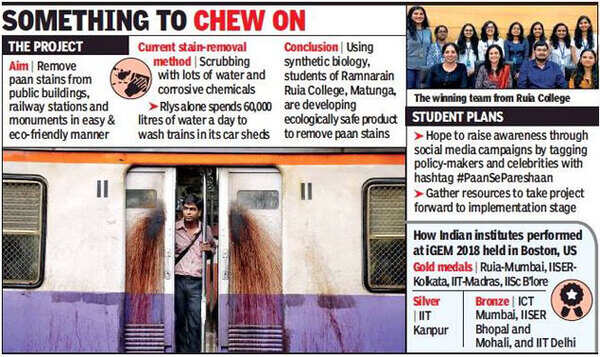- News
- City News
- mumbai News
- Red letter day: Paan stain eraser wins students a US award
Trending
This story is from November 13, 2018
Red letter day: Paan stain eraser wins students a US award
A team of eight girls from Ramnarain Ruia College, Matunga, Maharashtra, discovered microbes and enzymes that turn the red paan colour into “a harmless colourless product." Railways in Mumbai alone spends crores on scrubbing off paan stains manually. The team got a grant of Rs 10 lakh and a gold medal from the Genetically Engineered Machines (iGEM) 2018 held in Boston, US.

Key Highlights
- Matunga students discovered microbes and enzymes that turn the red paan colour into “a harmless colourless product”.
- The students researched with help of articles and realized that railways use 60,000 litres of water to clean trains in the car shed every day.
- The team got a grant of Rs 10 lakh from department of biotechnology to participate in the event.
MUMBAI: A cost-effective and eco-friendly method of removing paan stains from roads, railway stations and monuments recently won a team of eight girls from Ramnarain Ruia College, Matunga, recognition on an international platform. The team not only won a gold medal at the Genetically Engineered Machines (iGEM) 2018 held in Boston, US, but was also the only undergraduate college among the 300 global teams to get a prize for best integrated human practices.

Inspired by the Swacch Bharat Abhiyaan, the students set out to find an environment-friendly solution to wipe off stubborn paan stains from public spaces. The students discovered microbes and enzymes that turn the red paan colour into “a harmless colourless product”. Sanika Ambre, one of the students, said they plan to use these enzymes in a gel form to rid spaces of stains. They interacted with paan vendors, railway managers and cleaning agencies to integrate feedback into the final product design. “We met paan vendors to understand the ingredient in the paan that gives the colour. We realized that catechu and slake lime are responsible for the red-brown colour. We also met some cleaners to understand the practical difficulties in washing off paan stains. We interacted with industries to find out about chemicals used as cleaning agents,” said Shrutika Sawant, one of the final-year BSc microbiology students from the team.
The team discussed the efforts taken to clean trains and platforms with station masters. “We were told that approximately 10 litres of acid is used every month to clean paan stains from Sion station alone. While smaller stations get three to four cleaners to clean platforms, some big ones outsource the work to cleaning agencies,” said Sanika Ambre, another student.
Mayuri Rege, a faculty funded by the department of science and technology who led the project, said the students realized they can spread awareness though anti-spitting drives. “The students started a social media drive with the #PaanSePareshan to raise awareness and they plan to continue with it,” said Rege. They are now looking forward to getting grants to take their project forward. Chief minister Devendra Fadnavis felicitated the winning team on Sunday.
The team included Aishwarya Rajurkar, Anjali Vaidya, Komal Parab, Nishtha Pange, Maithili Sawant and Mitali Patil. Faculty members of the team which went to the US, included Rege, in charge principal Anushree Lokur, and two junior faculty members, Sachin Rajagopalan and Mugdha Kulkarni, as Instructors. iGEM is an independent non-profit organisation dedicated to advancement of synthetic biology.

Inspired by the Swacch Bharat Abhiyaan, the students set out to find an environment-friendly solution to wipe off stubborn paan stains from public spaces. The students discovered microbes and enzymes that turn the red paan colour into “a harmless colourless product”. Sanika Ambre, one of the students, said they plan to use these enzymes in a gel form to rid spaces of stains. They interacted with paan vendors, railway managers and cleaning agencies to integrate feedback into the final product design. “We met paan vendors to understand the ingredient in the paan that gives the colour. We realized that catechu and slake lime are responsible for the red-brown colour. We also met some cleaners to understand the practical difficulties in washing off paan stains. We interacted with industries to find out about chemicals used as cleaning agents,” said Shrutika Sawant, one of the final-year BSc microbiology students from the team.
The team discussed the efforts taken to clean trains and platforms with station masters. “We were told that approximately 10 litres of acid is used every month to clean paan stains from Sion station alone. While smaller stations get three to four cleaners to clean platforms, some big ones outsource the work to cleaning agencies,” said Sanika Ambre, another student.
The students researched with help of articles and realized that railways use 60,000 litres of water to clean trains in the car shed every day. Central and Western railways in Mumbai alone spends crores on scrubbing off paan stains manually. The product proposed by the students will require less water. The team got a grant of Rs 10 lakh from department of biotechnology to participate in the event.
Mayuri Rege, a faculty funded by the department of science and technology who led the project, said the students realized they can spread awareness though anti-spitting drives. “The students started a social media drive with the #PaanSePareshan to raise awareness and they plan to continue with it,” said Rege. They are now looking forward to getting grants to take their project forward. Chief minister Devendra Fadnavis felicitated the winning team on Sunday.
The team included Aishwarya Rajurkar, Anjali Vaidya, Komal Parab, Nishtha Pange, Maithili Sawant and Mitali Patil. Faculty members of the team which went to the US, included Rege, in charge principal Anushree Lokur, and two junior faculty members, Sachin Rajagopalan and Mugdha Kulkarni, as Instructors. iGEM is an independent non-profit organisation dedicated to advancement of synthetic biology.
End of Article
FOLLOW US ON SOCIAL MEDIA










